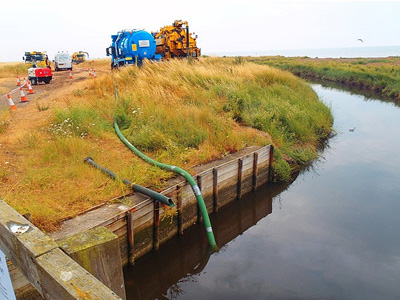Source: Environment Agency
Southern Water were today fined £500,000 and agreed to pay costs of £19,224 at Canterbury Crown Court after an Environment Agency (EA) investigation found that untreated sewage was discharged into the Swalecliffe Brook, polluting a 1.2 kilometre stretch of the watercourse and killing local wildlife.
Swalecliffe Brook flows through the Thanet Coast Site of Special Scientific Interest (SSSI) before joining the north Kent coast to the east of Whitstable, a section of the coast which forms part of the Saxon Shore Way.
The court heard that Southern Water did not respond quickly enough to the pollution, which occurred on 21 July 2013 when untreated sewage discharged via the Brook Road Wastewater Pumping Station’s emergency outlet.
The pumping station had encountered operational issues in the week leading up to the pollution event.
As a consequence of the spillage, restrictions were placed on bathing at local beaches. Local shellfish growers were advised that if tests showed high levels of contamination they would be unable to sell the shellfish harvested locally ahead of the Whitstable Oyster festival 2013.
 Responding to a report from a member of the public, Environment Agency officers found the water was heavily discoloured with dead sticklebacks and eels at regular intervals along the polluted stretch of the watercourse.
Responding to a report from a member of the public, Environment Agency officers found the water was heavily discoloured with dead sticklebacks and eels at regular intervals along the polluted stretch of the watercourse.
Water quality monitoring carried out on site recorded high levels of pollution and very low dissolved oxygen. This indicated that the brook had indeed been contaminated with untreated sewage.
A survey identified 249 fish had been killed as a result of the polluting discharge, including 155 eels which are a critically endangered species.
The court heard that the polluting discharge had a wider detrimental impact on amenity value of the area, as well as hearing summaries of statements provided by local businesses. The incident occurred just days before the popular Whitstable Oyster Festival, with the brook discharging into coastal waters that contain numerous commercial shellfish beds, an integral part of the town’s economy and heritage.
Whitstable oysters are a world renowned brand, and the Environment Agency’s investigation highlighted that local businesses remain concerned about the impact the discharge has had on the brand reputation.
In response to defence given by Southern Water Her Honour Judge Adele Williams said that failure to act upon alarms cannot be laid at the door of one employee, calling it a failure of management.
Alan Cansdale, Environment Manager at the Environment Agency, said:
“Southern Water has acknowledged that they had sufficient warning and knowledge of the incident to minimise the impact on the local environment, but failed to act swiftly and notify partners to help this happen. This incident, and the scale of the subsequent environmental impact, was a result of inadequate urgency to recognise there was a problem at the site.
My officers are carrying out ongoing reviews of the Southern Water infrastructure involved in this incident, and we are pleased that Southern Water Services have acknowledged improvement is needed and have committed over £500,000 to increase the standards of wastewater treatment at the site.
Canterbury City Council’s assistance was vital in the response to the incident and their subsequent expert guidance and technical input in bringing this important issue to court. We will continue to work with them to improve bathing and shellfish water quality remains one of our joint top priorities.”
Canterbury City Council’s Environmental Health Officer, Sarah Maloney, said:
“We were pleased to be able to work in partnership with the Environment Agency in this case. The good reputation of our shellfish industry is very important to local businesses and the council. We work hard all year to ensure our residents and visitors are able to enjoy local shellfish safely, so it’s vital we can respond to pollution events such as this promptly and effectively.”










